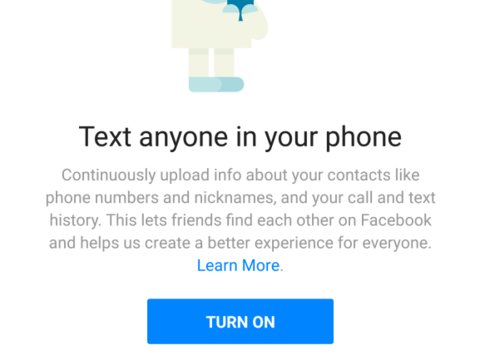
- A Facebook client was startled to find that the informal organization had been keeping records of his telephone calls and messages. A report from Ars Technica supported his discoveries.
- Accordingly, Facebook says that it’s a select in highlight on Messenger for Android, and also the low-information Facebook Lite and that it’s tied in with improving the interpersonal organization.
- Be that as it may, there’s motivation to trust that the fundamental Facebook application could have been discreetly gathering this information as well, until the point that Google rolled out a few improvements to Android in October 2017.
Throughout the end of the week, one Dylan McKay downloaded the file of all his Facebook information and found that the interpersonal organization had been keeping broad records of the calls and messages he had produced using his Android telephone.
A report from Ars Technica certified McKay’s discoveries not long after: in specific situations, Facebook’s Android applications will keep logs demonstrating the names of the general population you called and messaged, to what extent the discussion kept going, and the other party’s telephone number.
McKay’s unique Twitter post has just about 40,000 retweets at the season of composing. Security fears around Facebook are at an untouched high after the Cambridge Analytica embarrassment, where 50 million clients had their information utilized disgracefully by a political research firm.
Downloaded my facebook data as a ZIP file
Somehow it has my entire call history with my partner’s mum pic.twitter.com/CIRUguf4vD
— Dylan McKay (@dylanmckaynz) March 21, 2018
Because of reports throughout the end of the week, Facebook distributed a blog passage giving its side of the story.
To start with, Facebook says, it didn’t do anything without authorization. It says that keeping logs of call and content information is a select in include on two of its Android applications: You get incited to share that information after introducing Facebook Messenger, and the low-information Facebook Lite. Keeping those records “causes you find and remain associated with the general population you think about, and give you a superior ordeal crosswise over Facebook,” says the blog.

It likewise says that the information isn’t sold to any outsider, and that Facebook doesn’t read your writings or tune in to your telephone calls. Moreover, says Facebook, it’s not insane to request access to your contacts: “Contact merchants are genuinely basic among social applications and administrations as an approach to all the more effectively discover the general population you need to associate with.”
Be that as it may, the Ars Technica report gives somewhat more purpose behind Android clients to stress.
Until the point that Google established a few changes in October 2017, permitting an application to get to your contacts could likewise give it access to the sorts of call and content records being referred to in this issue. As indicated by the report, the majority of the call and content records end in October 2017 — which recommends, however does not demonstrate, that the principle Facebook application for Android was exploiting that strategy to get the information.
All things considered, Facebook keeps up this has dependably been a select in highlight, and that clients would have been incited.
Likewise of note is that Apple’s iOS, the working framework on the iPhone and iPad, doesn’t enable that sort of access to call and content information at all without particular authorization. That implies Apple fans don’t need to stress as considerably over Facebook having call or content records.
Facebook gives an instrument to see which contacts have been transferred to Messenger, which you can get to here. In any case, it’s a decent update in case you’re extremely worried about online protection, mull over transferring your address book.
Original article by Matt Weinberger